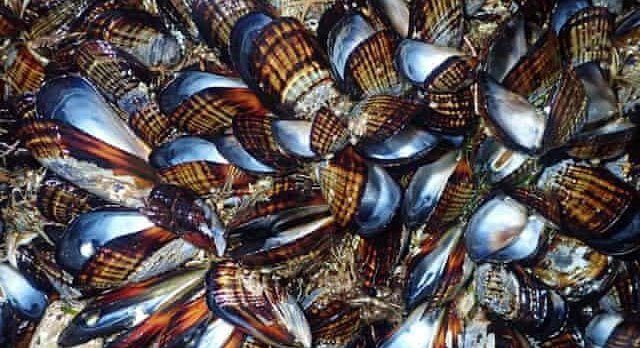Hot sunshine record 'grilled' mussels turned on shells in the sea in California
California is suffering a record heat wave that has caused the largest number of mussels in the northern coast of the state to die in the last 15 years.
According to the Guardian, during his entire time working in Bodega Bay, northern California, marine conservation researcher Jackie Sones had never seen anything like that: dead mussels washed ashore, shells of they opened and the flesh inside seemed to be boiled.
The record heat wave that took place in California this month caused the largest mass death in the last 15 years at Bodega Bay. At the same time, Ms. Sones also received notice of mass slaughtering in many areas on the state's 225km long coastline.

The mussels died on the California state coast.(Photo: Jackie Sones).
While many people flock to the beaches to enjoy sunny days in temperatures of 27 degrees Celsius, when the tide falls, the sandbars of the mussels are exposed in the sun without a layer of seawater. and the temperature can reach 37 degrees Celsius, making animals nearly roasted in their shells.
Sones expert said that the sudden drop of the mussel population will lead to other serious consequences for the coastal ecosystem."Mussels are known as animals as a basis for ecosystems. Their role is the same as trees in the forest - providing shelter and habitat for many other animals, so when the environment is This core life is affected, it will negatively impact the rest of the ecosystem, " said Sones.
"I think this will affect the entire region, but there must be others to go there and record the situation to know the severity , " Ms Sones said.
Previous studies of marine ecosystem health have focused on two aspects: rising sea temperature and the effect of acidification on marine organisms . Kelp and coral are suffering when sea water warms up, while other animals like starfish or shellfish also decline.
But there is very little data on the impact of transient extreme weather events on the coastal environment. Northwestern University biologist Brian Helmuth has designed a robotic mussel to measure and record temperature in the habitat of the species.
"We no longer think of climate change as a future issue when we do the forecasting work. Everything becomes how to prepare for what's going on , " said Helmuth. share.
Biologist Christopher Harley of the University of British Columbia recorded a similar event in Bodega Bay that took place in 2004, but he and Mrs. Sones said that this year's mass die is much larger.
"These events are becoming more and more frequent and serious , " Harley said, adding that there are a lot of dead mussels washed ashore in large numbers from California up to the state of British. Columbia of Canada.
- Hot sunshine, Hanoi is as empty as ... Ba Danh pagoda
- Harmless knowledge is not known to anyone of mussels and mussels
- Discovered 7 new leech species living in freshwater mussels
- The truth about shrimps is that many people think they know that they turned out to be wrong
- Why is Hanoi and the Northeastern provinces hot in record?
- California bottled sunshine
- Spectacular natural disaster scene in America
- Super glue that mimics gecko feet and mussels
- Behind the lovely sunshine doll of Japanese people is a pretty scary story
- Who should not eat grilled fish?
- The asphalt road melted
- Manufacturing self-healing gel from boys
 Is the magnetic North Pole shift dangerous to humanity?
Is the magnetic North Pole shift dangerous to humanity? Washington legalizes the recycling of human bodies into fertilizer
Washington legalizes the recycling of human bodies into fertilizer Lightning stone - the mysterious guest
Lightning stone - the mysterious guest Stunned by the mysterious sunset, strange appearance
Stunned by the mysterious sunset, strange appearance